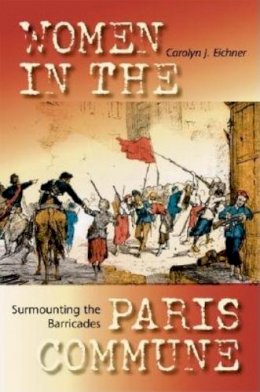
Surmounting the Barricades: Women in the Paris Commune
Carolyn J. Eichner
This book vividly evokes radical women's integral roles within France's revolutionary civil war known as the Paris Commune. It demonstrates the breadth, depth, and impact of communard feminist socialisms far beyond the 1871 insurrection. Examining the period from the early 1860s through that century's end, Carolyn J. Eichner investigates how radical women developed critiques of gender, class, and religious hierarchies in the immediate pre-Commune era, how these ideologies emerged as a plurality of feminist socialisms within the revolution, and how these varied politics subsequently affected fin-de-siècle gender and class relations. She focuses on three distinctly dissimilar revolutionary women leaders who exemplify multiple competing and complementary feminist socialisms: Andre Leo, Elisabeth Dmitrieff, and Paule Mink. Leo theorized and educated through journalism and fiction, Dmitrieff organized institutional power for working-class women, and Mink agitated crowds to create an egalitarian socialist world. Each woman forged her own path to gender equality and social justice.
Product Details
About Carolyn J. Eichner
Reviews for Surmounting the Barricades: Women in the Paris Commune
European History Quarterly
For 72 days following the disastrous 1871 Franco-Prussian War, working-class and socialist Parisians challenged the French government. At the end of May 1871, the French Army stormed the city, attacked the insurgents' barricades, and left over 25,000 rebels dead. Most textbooks ignore the role women played in this revolt. Eichner (women's studies, Univ. of South Florida) corrects this oversight. She uses three revolutionaries, Elisabeth Dmitrieff, Andre Leo, and Paule Mink to represent the greater number of nameless female communards who challenged the strict gender and class boundaries that relegated French women to a status equal to that of minor children. Chapters explore the short-lived Commune from a refreshingly new feminist perspective. Each of the three women brought their different strengths to this revolt, representing the differing constituencies of women present on the barricades. Dmitrieff excelled at labor organizing, Leo used her writing skills to challenge the accepted roles allocated by French society to all women, and Mink specialized in grassroots activism. Despite the failure of the Commune, all of Eichner's protagonists continued their public activism, refusing to allow their dreams for an egalitarian society to die. Summing Up: Recommended. Most academic levels/libraries.
R. V. A. Gomez
Anne Arundel Community College , 2005oct CHOICE
